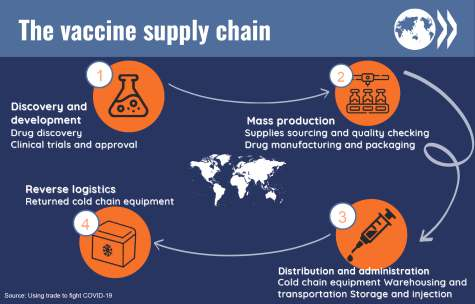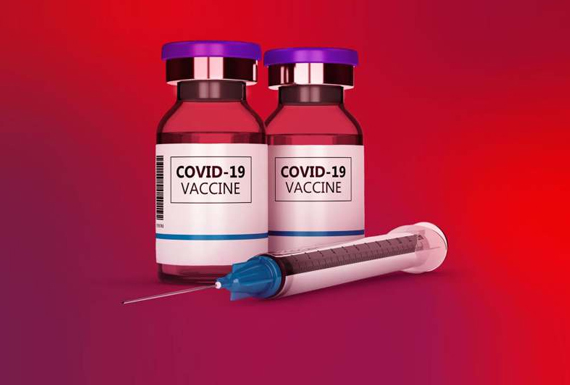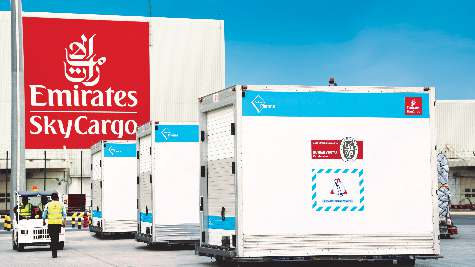Air cargo & pharma embark on worldwide ‘mission of the century
It’s more than a year since the Coronavirus plunged the world into uncertainties, but the health and economic crisis are deepening with new more aggressive strains wreaking havoc on some countries ill prepared to handle the situation on a large-scale.
The pandemic continues to take heavy toll on people with more than 158 million COVID cases and over 3.30 million deaths recorded in early May. Millions have lost their jobs and plunged into poverty while many economies remain depressed, accumulating mountains of debt with business activities hugely disrupted.
 The COVID-19 vaccines that were miraculously developed in less than a year through combination of science and technology offer a ray of hope to control, if not end this pandemic.
The COVID-19 vaccines that were miraculously developed in less than a year through combination of science and technology offer a ray of hope to control, if not end this pandemic.
But it involves an enormous logistical challenge for both the air cargo and pharmaceutical industries with some 12-14 billion doses needed this year to inoculate the majority to protect people and prevent the spread of the virus.
Billions more are needed throughout the year and thereafter as the vaccines are only effective within a period of four to six months only, thus, regular vaccinations are needed, according to experts.
Roadmap to recovery
Controlling the spread of COVID-19 and ensuring rapid and widespread vaccine deployment is key to global economic recovery.
While uncertainties remain high at this point, the World Bank is convinced the global economy could swiftly rebound and possibly grow at nearly 5 percent with successful pandemic control and faster vaccination process.
More than a billion COVID vaccines have so far been transported, distributed and administered around the world thanks to collaboration between governments, health and other organizations, private sector and various industries, air cargo and pharma in particular, which are tasked to undertake what the International Air Transport Association (IATA) dubbed as the “mission of the century.”
IATA said governments must see air cargo as an essential part of the fight against COVID-19 and a vital partner in facilitating global economic recovery.
“Air cargo continues to be the bright spot for aviation. Demand reached an all-time high in March, up 4.4% compared to pre-COVID levels (March 2019). And airlines are taking all measures to find the needed capacity. The crisis has shown that air cargo can meet fundamental challenges by adopting innovations quickly. That is how it is meeting growing demand even as much of the passenger fleet remains grounded. The sector needs to retain this momentum post-crisis to drive the sector’s long-term efficiency with digitalization,” said Willie Walsh, IATA’s Director General.
GAVI, the vaccine alliance, said although COVID-19 vaccines have been rolled out, the vaccination is moving at different paces due to supply bottlenecks, logistical challenges, issues with vaccine scheduling and vaccine hesitancy or refusal.
“Increasing vaccination coverage by just 1% can save thousands of lives and millions of dollars in medical costs and lost economic productivity. The researchers suggest that investing in a rapid roll-out at the start could save money that could be further invested in continuing vaccine delivery,” GAVI said.
Complex mission
The challenge of COVID-19 vaccine global distribution demands the air cargo industry to deliver the humanitarian shipments in the highest form of speed, security, reliability and transparency. Open communication and communication across the supply chain is also paramount and cannot be underestimated, The International Air Cargo Association (TIACA) said.
“The air cargo industry has an important role in the global distribution of COVID-19 vaccines and their peripherals, especially across continents. According to IATA, airfreight demand for the vaccines will be massive with aggregate volumes being the equivalent to 8,000 freighters based on 9 billion vaccine doses to meet global requirements,” TIACA said in its Project Sunrays Report titled “Readying Air Cargo Communities for COVID-19 Vaccine Transportation and Handling: Recommended Practices.
The report pointed out vaccine logistics require investment on specialized cold-chain storage and warehouses, the right equipment, highly-skilled people, precision and care in handling the vaccines or their potency will be lost.
“COVID-19 vaccines are high value and highly time and temperature-sensitive products. Most require 2-8 degrees C, some require -15 to -25 degrees C while the Pfizer-BioNTech mRNA vaccine has an extreme storage temperature of -70 degrees C. Once temperature deviations occur, the vaccines’ potency will be lost and cannot be regained,” TIACA pointed out.
Air cargo airlines, airports, logistics, warehousing and even trucking companies, have quickly adopted to safely deliver COVID-19 vaccines on air or land.
Armed with the most sophisticated temperature-controlled storage facilities and equipment, including unit load device and solutions, airfreight carriers have successfully transported millions of COVID vaccines across the world.
Emirates SkyCargo, for instance, disclosed it has moved around 59 million doses of COVID-19 vaccines to more than 50 destinations around the world since they were rolled out early this year.
The company prides itself for having the world’s largest GDP compliant air cargo hub in Dubai for global distribution of COVID-19 vaccines. It has also set-up a dedicated rapid response team to coordinate requests from the various partners involved in the international vaccine distribution ecosystem and to streamline the carrier’s response to vaccine transportation requests.
American Airlines Cargo, meanwhile, has furthered its commitment to reliable temperature-controlled shipping by expanding its solution for transporting temperature-controlled shipments to its entire mainline fleet.
This expansion follows a number of tests and trials conducted in partnership with CSafe Global and CargoSense. Through the use of CSafe Global’s industry-leading packaging and Temperature Loggers provided by CargoSense, American proved all of its aircraft offer ideal environments for passive temperature-sensitive shipments.
The successful trials allow American to nearly double its capacity for handling ExpediteTC solutions and extend the airline’s cold-chain solution network to 30 new stations, including in-demand cities like Cincinnati, Memphis and Pittsburgh.
“When it comes to cold chain shipments, reliability is crucial for our customers,” said Roger Samways, Vice President of Commercial for American Airlines Cargo. “By expanding our offering of temperature-critical shipping on all mainline flights, we are able to provide our customers with access to more than 180 markets, marking the largest cold-chain network in our history.”
The US has the world’s highest number of COVID cases at 33 million and deaths of over 581,000.
In Europe, Lufthansa Cargo announced its pharma centers in Munich and Chicago, which opened in the summer of 2020, recently became IATA CEIV Pharma-certified. This means that, in addition to CEIV Pharma certification as an airline, Lufthansa Cargo offers an excellent pharma network of 32 stations worldwide. Lufthansa said this is particularly relevant in transporting the highly-sensitive COVID-19 vaccines.
Turkish Cargo, another major and most sought-after cargo brand globally, assured its capabilities of handling COVID-19 vaccines in the highest standards through its state-of-the-art technology and infrastructure and modern freighters with a wide network of routes.
“We touch human life by carrying COVID-19 vaccines within the required time and temperature range at the highest quality standards to the destinations they are intended. We have the necessary infrastructure to carry all kinds of Covid-19 vaccines, and we carry health all around the world,” the company said on its website.
TIACA said while the air cargo industry has proven its resilience and agility in this crisis, it will need to agility and cohesion in tackling its challenges on issues of digitalization, safety and security, sustainability, liberation and collaboration.
“TIACA is committed to working with its members, the broader industry, association partners and government agencies to ensure we have a united and successful air cargo industry. We have demonstrated considerable success over the past months but as we go forward new challenges will materialize. We will need to be more innovative, agile and focused as an industry to overcome them,” said Steven Polmans, TIACA Chairman.















